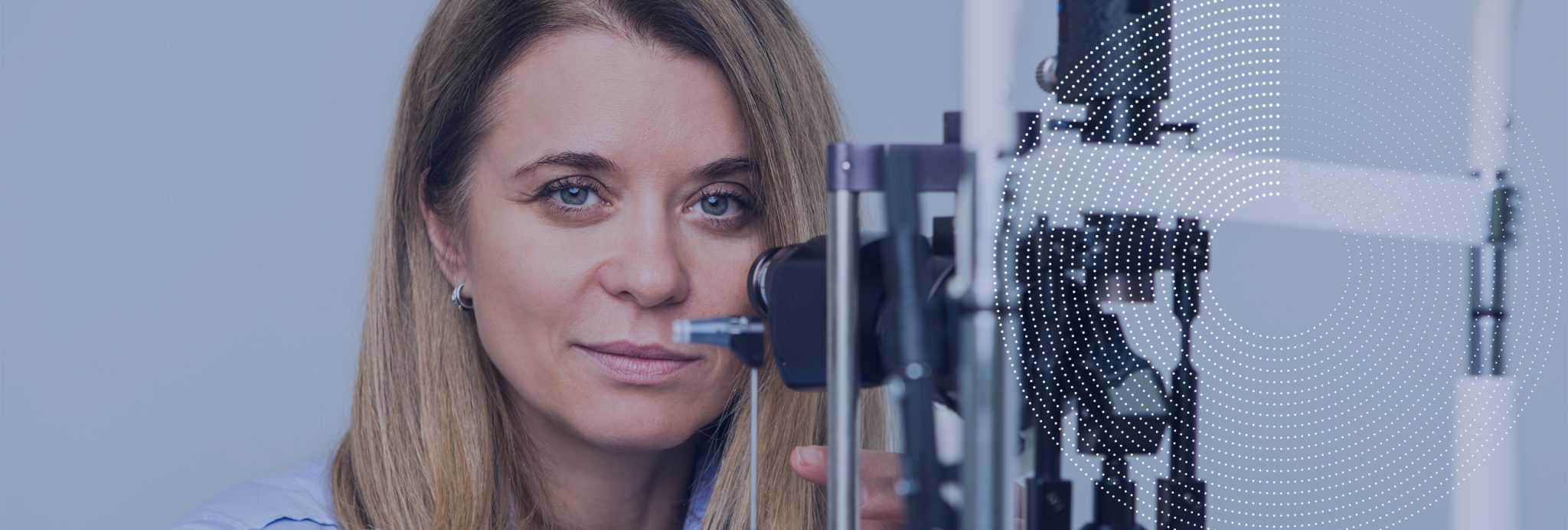I never thought that I would become a surgeon… I cannot say that I had dreamt of becoming one since I was a child. My profession, which as the years passed, developed into a true passion, was not a revelation either, but the result of many years of searching for my own way. And precisely because of that, I think that I have chosen the right path.
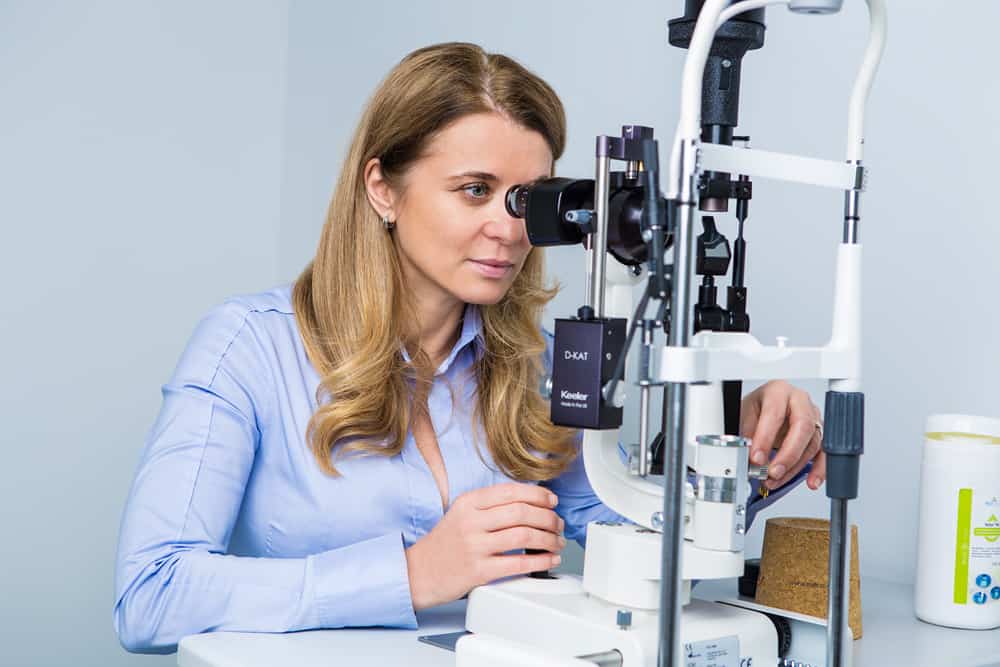
About me
There were no doctors among my immediate family members and I think this might be the reason why I started studying medicine. Nobody was there to get this idea out of my mind in advance, making me realise how hard it would be. However, a part of my father’s family established in Cracow had had connections with medicine for many years. Among my cousins, the Nowosielscy family, there was a professor of ophthalmology, another professor, an author of a manual on forensic medicine, a professor of paediatrics at the Jagiellonian University. Such important figures…
Beginnings
I passed the entrance exams for the Medical University of Warsaw with an excellent result. However, the first year was so tough I even considered leaving the university. I can still recall classes in the Dissecting Room. I really thought that I would not be able to go through them. After having passed the final exams on Polish language and literature at the Klementyna Hoffmanowa High School in Warsaw, dissecting a human body into pieces seemed to be a profanation of Baudelaire and the Young Poland movement all together. Luckily, after having finished the first year, it started to get better…
During my studies, different fields of medicine and medical science interested me. Microbiology was the very first of them. I was especially interested in virology and the whole process of viral oncogenesis – the formation of cancer caused by virus. I find it extremely interesting how something that is not even alive itself can wreak such havoc in the human body… I spent some time in the Department of Microbiology, where I lectured students. After having finished the third year of my studies, I was awarded the Best Student Prize PRIMUS INTER PARES and I got the chance to continue my studies following an individual programme.
Ophthalmology – my passion
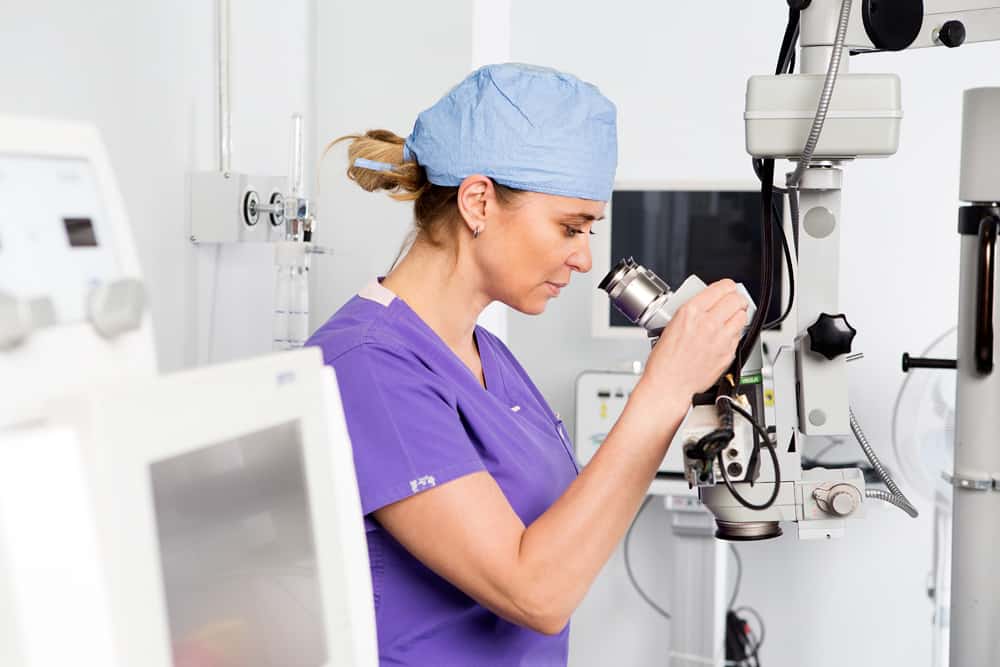
At the end of my studies, I got interested in neurosurgery. That is how my fascination with the nervous system began. However, the daily work of a neurosurgeon turned out to be too emotionally exhausting. Then, the eye – a little organ, as fascinating as the human brain – attracted my attention. I learned that ophthalmology had a lot in common with neurology and it also offered enormous opportunities for those who wanted to help patients. I have always wanted to use my knowledge, experience and skills to help those who need it most and thus have an impact on their lives. I believe that we can influence other people’s lives if we help them wisely and creatively. I am convinced that I can change some part of people’s lives for the better, regardless of what happens to them in the future. From the very beginning, I was sure that I wanted to perform surgeries, because it was the only way to help patients directly.
Unfortunately, at the end of the nineties, it was not possible to undergo training in ophthalmology in Warsaw. I decided to start it as a volunteer, but it was extremely difficult to reconcile professional training with work and daily life. I remember that I had to give up leisure, such as going to the cinema, because I could not afford it. At that time, half of the students who formed part of my group went to the United States. So did I. I passed the UMSLE examination to validate my degree, but in the end I realized that emigration was not for me. I came back. Once I had returned to Poland, I decided that I would follow the steps of many of my friends who finished studies other than medicine – take care of myself, stop daydreaming about becoming a doctor with a mission and finally earn some money. At that time, many companies conducting clinical trials entered the Polish market, so I started working for one of them. I stayed with Quintiles for two years. After having spent hours at my desk and having collaborated with practising physicians, I became convinced that I wanted to return to medicine. I was working and saving money to continue my studies. At the same time, I was collecting data on conducting trials according to the international standards. This allowed me to develop a research project on glaucoma medications for MERC.
Everything is possible
Two years later, I got another chance to fulfil my dreams thanks to Wojciech Czarnecki, DMSc. The Head of the Department of Ophthalmology in the Brodnowski Provincial Hospital accepted me into a residency programme. However, returning to medicine was not easy. I worked as a volunteer for two years without earning any money. But, thanks to my savings, I could start my adventure with surgery under the watchful eye of Dr Czarnecki.
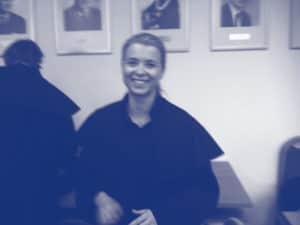
I also learned to examine and treat diabetes, as I worked in the biggest hospital which specialized in diabetes in Warsaw at that time. Dr Ewa Graczyńska from the Centre for Retinal Diseases nurtured in me a love for the retina. I performed my first laser treatments for diabetes in collaboration with her. It may seem unbelievable, but 15 years ago the laser treatment was the only option for patients with diabetes in the majority of hospitals. Nowadays, I sometimes perform several vitrectomies associated with diabetes in one day. This was the very first time I encountered patients who had been told that “nothing can be done about their condition”. Most of them accepted their situation, but I started to feel rebellious. I felt that it was impossible and new methods and ways of helping those patients should be searched for, at any cost. Many of my colleagues thought that there was no point in worrying about retinal diseases because nothing could be done about them; the only thing that mattered to them was to maintain order in the documentation. I could not accept that. Documents cannot be more important than people. Does well-organized documentation even matter as compared to the ability to see? In that moment, I realised that in Poland we were lacking specialists in the field of retinal diseases treatment, and especially – retinal surgeons. In other countries, treatment for this group of conditions was much more developed. I set myself a goal – to reach people who were experts in the field.
A window onto the world
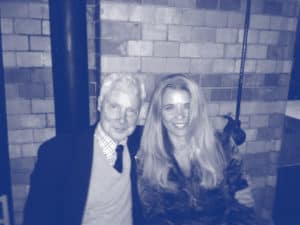
The first international conference I participated in took place in Vienna. Before the conference, I had visited all the pharmaceutical companies operating in Poland in order to find sponsorship and get there. Fortunately, I found one. Otherwise, I could not have afforded it as a volunteer. Then, I passed the Speciality Exam of Ophthalmology of I Degree and finally, I got a desired full-time job in a hospital. But my salary was so low that I could barely make a living. The next step was a training programme at the Wills Eye Clinic under the supervision of Doctor George Spaeth, an internationally renowned specialist in the field of glaucoma treatment. We still stay in touch, even though the doctor has already retired. The following years were marked by conferences, new knowledge and professional contacts. In 2001, I got a scholarship awarded by the European Society of Ophthalmology and I went to one of the best hospitals in Europe. In the Moorfields Eye Hospital, under the supervision of Professor Zdenek Gregor, I learned to perform vitrectomies and I treated many patients with diabetes.
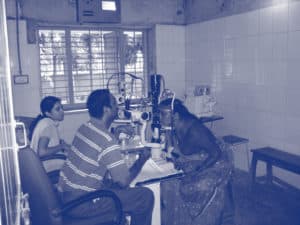
Dr Vasavady’s Clinic
During one of my overseas trips, I unexpectedly met Dr Fechner from Germany. He was returning from the same conference, so we started talking. Dr Fechner invited me to his clinic in Hamburg, where I performed cataract surgeries. He also introduced me to an extraordinary person, Dr Dalit Singh, from India. The late Dr Dajlit Singh was a real treasure trove of knowledge. Together with Jan Worst, he invented iris-claw lenses that are fixated to the iris. Dr Singh invited me to India. But life often has its own plans. It planned for me a break on the path to my medical career. When I was preparing for the trip, I learned that I was going to be a mother. I cancelled the trip, but I continued my work. Six months pregnant, I performed my first, autonomous vitrectomy at the Accident & Emergency Unit. It was a scorching summer of 2003. Wojtek, the most beautiful boy in the world, was born. Professionally, I was planning to finish my PhD thesis, but I had no plans for the future. However, I had to pass the Speciality Exam of Ophthalmology of II Degree, so I devoted my time to the studies.
In 2006, out of a lack of new opportunities at the Brodnowski Provincial Hospital, I started a training course at the CMKP Clinic at the Orlowski Hospital in Warsaw. While I was working there, I started to collaborate with the University. As an academic, I had been lecturing students and doctors in training, as well as preparing research papers and speeches for numerous conferences. With the help of Professor Iwona Grabska-Liberek, I finished and defended my PhD thesis on treatment for eye diseases associated with diabetes.
At the End of the World
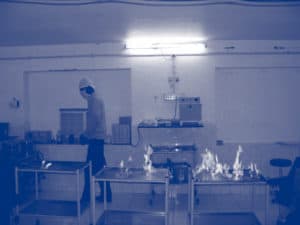
Dr Vasavady’s Clinic
A training course in the framework of the European Vitreo-Retinal Training School in Bremen, where I met Professor Klause Lucke, founder and president of the European Vitreo-Retinal Society, was one of the milestones in my professional life. We became friends and he was the person who pushed my professional development ahead. I wanted to learn how to perform surgeries and, thanks to the contacts of Professor Lucke, I got a chance to go to Ahmedabad, in the Gudjarat province, in India. I learned how to perform cataract surgeries in the Clinic of Doctor Vasabada. He is considered to be one of the best surgeons in the world. It was not an easy time – training and accommodation were very expensive.
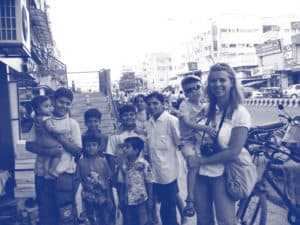
My four-year old son was there with me. I worked and he attended an Indian nursery. It was difficult for him to adapt to a country with such a different cultural background. Everything would amaze him. Once, he saw cows lying on the crossing and said: “Mum, look, cows direct the traffic here!” I would struggle to prepare meals for him. I would remember the recipe my grandmother followed to prepare cottage cheese for him, I would go to a distant, Muslim part of the city to buy eggs. Wojtek, with his crop of blond hair, fascinated the people. Cleaners who worked in the hospital would make him polystyrene toys, which he really enjoyed. Professionally, it was a very rewarding time for me. I learned how to perform surgeries in a clinic run by the Red Cross. The conditions that prevailed there were extremely difficult. There was no air conditioning and the temperature would rise to 50 degrees. The tables used for surgeries were disinfected by burning them, but the equipment was better than in many hospitals in Poland. India – a country of contrasts. We operated on poor Indian people who lived in the streets, but every person, even the poorest, had to pay for the surgery, even a penny, because in conformity with their beliefs, people do not respect what they get for free. Dr Vasavada used to say that being a surgeon is not only about the knowledge and manual skills, but, above all, strength of character. I came to understand this many years later when I was performing a vitrectomy, as it turned out that the decisions taken during a surgery can influence someone’s life and health, and the surgeons find themselves alone with the consequences of their decisions.
My Place on Earth
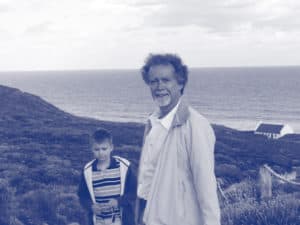
prof. Klaus Lucke and Wojtek
Professor Klaus Lucke, who was mentioned before, and the European Vitreo-Retinal Society, had an enormous impact on my professional development and my career. In EVRS, I was responsible for a section for young surgeons, I organized several courses and I carried out autonomous presentations at annual conferences for four years. I finally found a place where I could learn, discuss, and exchange views and best practices with others. I completed an internship under the supervision of Professor Lucke, who trained me in performing vitrectomies. Thanks to him, since 2006, I have been performing intravitreal injections using Avastin, among other medicines. I was certainly one of the first doctors in Poland to start using this medicine. Since then, I have performed more than 11 000 of such injections.
In 2010, I started to work in the Mediq Clinic in Legionowo. In response to the patients’ enormous needs, I opened an outpatient clinic to treat retinal diseases. I introduced intravitreal injections that had never been carried out before. I created a team and trained its members. Six years later, it became the biggest outpatient clinic of this kind in the Mazovian Region. I would perform around 250 vitrectomies every year.
Now, after so many years of practice, it is time to create a place where I will be able to fully control the treatment by providing patients with the most effective, tested methods. I want to choose the best specialists to work with, decide about the quality of the equipment and the materials, have a real influence on the approach to patients and care standards. That is the reason why I am creating my own, personal project – Dr Nowosielska Ophthalmology and Eye Surgery. I want to take care of patients from the moment they enter the Clinic till the end of the treatment. I believe that everything is possible and I want my patients to have the confidence that we do everything in our power to provide them with the assistance they need.

 Ostry dyżur okulistyczny
Ostry dyżur okulistyczny